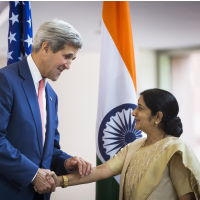WTO, NSA Snooping Overshadow Kerry Visit
 John Kerry and Sushma Swaraj in New Delhi (photo: Reuters)
John Kerry and Sushma Swaraj in New Delhi (photo: Reuters)
Both India and the U.S. are keen on boosting business and defence ties, but trade and spying tensions overshadowed the visit of U.S. Secretary of State John Kerry to New Delhi this week. The occasion was the annual India-US Strategic Dialogue, the first high-level interaction between the Modi administration and the U.S.
It provided both sides with a platform for gushing rhetoric in public. At a joint news conference Kerry said: “The moment has never been more ripe to deliver on the incredible possibilities in the relationship between our two nations”.
"The United States and India can and should be indispensable partners in the 21st century," he declared.
Not to be outdone, his Indian counterpart Sushma Swaraj said the two countries were at "an important turning point" and shared "converging long-term strategic interests."
She told the news conference that India was keen to see greater US business investment in India and strengthened defence cooperation.
The real purpose of Kerry’s visit was for both sides to prepare the groundwork before Narendra Modi’s visit to the U.S. in September. President Barack Obama had invited the prime minister to the White House after the NDA’s dramatic election victory in May.
Yet the huge elephants in the room during the meetings this week were the WTO trade deal and the National Security Agency (NSA) spying allegations.
The U.S. side was probably exasperated by the Indian veto that has scuppered the WTO facilitation agreement decided in Bali last September.
Kerry called on India to break down barriers to trade, subsidies and protectionism, which US firms have long cited as obstacles to doing business in India. He met Modi and told him that India's position on the issue was sending confusing signals to the international community.
Modi responded, according to the Times of India, by saying: “The first responsibility of my government is to the poorest people of the country. While we don't oppose the agreement, we believe that the needs of those living on the margins of society, not just in India but elsewhere too, have to be addressed.”
Meanwhile, Swaraj raised the issue of the NSA allegedly spying on the BJP when it was not in power. She told Kerry this was totally unacceptable to India.
The previous UPA administration had already registered a protest with senior US diplomats when the snooping was revealed in documents provided by whistleblower Edward Snowden. Swaraj reportedly reminded Kerry that snooping had no place in a “defining” partnership.
"I told Secretary Kerry that this was completely unacceptable to us as India and US are friendly countries. Friends don't snoop on each other," Swaraj told reporters.
Kerry reportedly sought to allay India's concerns, saying that Obama was reviewing all intelligence activities carried out by US agencies. He also said the US valued its partnership with India, particularly in counter-terror operations.
The joint statement issued by Kerry and Swaraj at the end of the Strategic Dialogue highlighted their plan to step up cooperation in combating “terrorism, proliferation of WMDs, nuclear terrorism, cross-border crime and address the misuse of the internet for terrorist purposes, in compliance with respective laws.”
- Top Stories
- Controversies
- Where is the Money Going?
- India and the World
- Appointments and Resignations
- Unusual News
- Latest News
- India College Chain’s Expansion into U.S. Draws Opposition from Massachusetts Officials over Quality of Education
- Milk Shortages in India Tied to Release of New Movies Featuring Nation’s Favorite Stars
- Confusion Swirls around Kashmir Newspaper Ban in Wake of Violent Street Protests
- Polio-Free for 5 Years, India Launches Vaccine Drive after Polio Strain Discovery
- New Aviation Policy Could Increase Service, Lower Ticket Prices






Comments